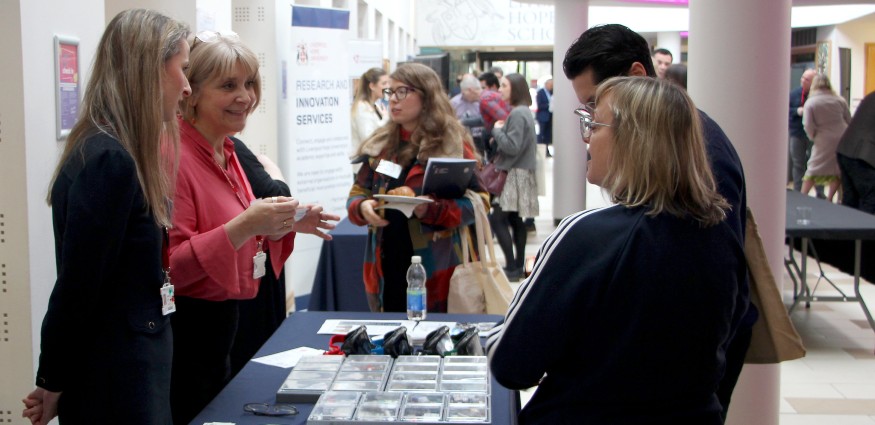Liverpool Hope University hosted health and social care organisations from across Liverpool City Region at a networking event designed to explore how the University can support the sector.
Representatives from more than 30 organisations attended Collaborate & Connect: How academia can engage and support Health and Social Care to learn about the cutting-edge research of Hope academics and to discuss how they can work in partnership with the University.
A diverse range of professionals were in attendance at Hope Park, where staff from Hope’s 10 Schools and Departments had the opportunity to showcase the impact of their research and hear what they can do to ensure they continue to meet the needs of the health and social care sector.
Professor Michael Lavalette, Dean of the School of Social Sciences, said: “Liverpool Hope is committed to being an outstanding partner to organisations within Liverpool.
“We work with many health and social care organisations who benefit from our research, but we are keen to do more as we proactively seek to make a positive contribution to the shaping of our region.
“This event not only allowed us to showcase how we can do that, but also fostered meaningful conversations on how the University can actively support the vital work of these organisations.
“We hope we can continue to forge partnerships that drive innovation and enhance the quality of health and social care services in Liverpool City Region.”
The event was opened by Vice-Chancellor, Professor Claire Ozanne, and included an address from Liverpool’s Director of Public Health, Professor Matt Ashton, who presented Liverpool City Council’s State of Health in the City: Liverpool 2040 report.
“The report talks about some of the key health challenges we have right now and what we will have by 2040 if we don’t change what we’re doing,” Professor Ashton explained.
“The reality is, in order to change those health and wellbeing outcomes, there is no one organisation or person who can change that, it has to be a systematic city-wide approach.
“Liverpool Hope University is a fantastic partner in the city and are crucial to helping us deliver that ambition of not getting those [negative] health outcomes by 2040.”
With a focus on how the University can support health and social care organisations to tackle the challenges they face, the event also featured presentations from two of the University’s existing partners, The Brain Charity and Nugent Care, who explained the benefits of working with Liverpool Hope.
Hetal Mainwaring, Head of People for Nugent, added: “Working with Hope’s School of Social Sciences has been really valuable.
“We initially started by supporting social work student placements at Nugent and the work the students have done within our secure homes and our community provision has been a breath of fresh air.
“They have come in and made changes to the way we work, which has been a positive move.
“We now need to expand [our partnership] to link in with Liverpool Hope Business School and the Psychology department to draw in some of the other expertise at the University.”



